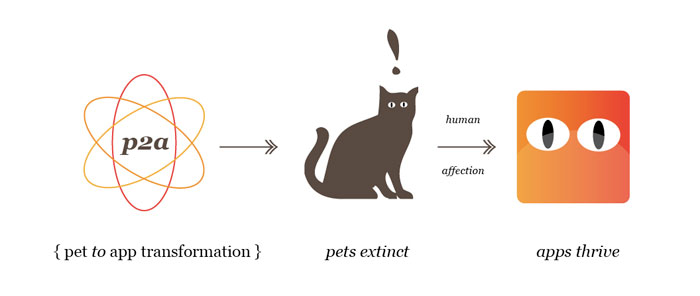The future is mobile pets
"When pets became apps" (or my family and other animals)
The naturalist Gerald Durrell lived as a child on the Greek Island of Corfu between 1935 and 1939. He writes brilliantly of his time there in "My family and other animals".He describes the life of the Durrell family on the island and their antics. But he also illuminates the rich fauna of the island, the relationships he develops with animals and his passion for exploring nature.
In March 2009 there were 2,300 apps available in the mobile market. In May 2011 Google announced Android mobile and listed 200,000 apps with 4.5 billion apps installed. Today Google Play has 450,000 apps available with 10 billion downloads to date, add to this Apple's 580,000 apps and that's a lot of apps.

In an article for the New York Times best-selling author Martin Lindstrom carried out an experiment to determine whether iPhones are addictive. The research showed that our brains respond to the sound of our phones in the same way they would respond in the proximity or presence of a boyfriend, girlfriend, or family member. He says, “... most striking of all was the flurry of activation in the insular cortex of the brain, which is associated with feelings of love and compassion.”
Lindstrom points out “As we embrace new technology that does everything but kiss us on the mouth, we risk cutting ourselves off from human interaction.” The chart above calculates on average we touch our smartphones 6 times an hour, 48 times in an 8 hour day, which works out at nearly 14,000 times a year, conservatively.
Who has an Android, iPhone or HTC? I do. I also have a son, a daughter and a beautiful wife. We all use numerous mobile devices. As a family we go out, do stuff; car rides, walking, sport, restaurants. At every moment we are accompanied by our 21st Century pets. They’re fed, cared for, looked after and seem to always be at the centre of what's going on.
They greet us, wink at us, buzz and hum when they require attention. They are highly intelligent, we take them wherever we go, we feed them information and they reward us with attention. They help us decide where and what to do, they even show us who to 'like'.
There are so many of them, at times they are quite demanding all wanting our undivided attention. But the temptation to go and find new species to bring back home is often irresistible.

Are we living through a time where history will say 'their pets became apps'? Where time and devotion historically given to a domestic animal or even a human partner was refocused toward mobile apps?
With ever increasing demands to keep businesses profitable, careers successful and relationships fruitful is the mobile app the new domestic pet? In our downtime, family and home time do we need to be more disciplined to maintain 'real world contact'? Apps are and will continue to transform the world, but will they transform behaviours as well and have far reaching effects or human contact?
Martin Lindstrom ends his article "My best advice? Shut off your iPhone, order some good Champagne and find love and compassion the old-fashioned way." I sympathise with this, but would like to strike a happy balance!


